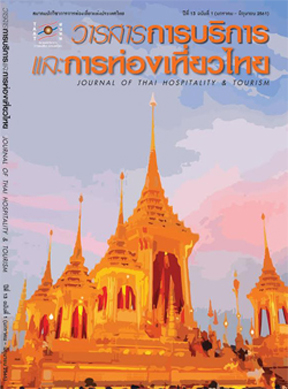การวิเคราะห์ศักยภาพทางการตลาดของธุรกิจให้เช่าอิเล็กทรอนิกส์สำหรับอุปกรณ์การเดินทางในประเทศไทย
Main Article Content
บทคัดย่อ
การเดินทางไปต่างประเทศ คือ กิจกรรมที่เป็นประโยชน์อย่างหนึ่งเพื่อหาประสบการณ์ใหม่และสำรวจวัฒนธรรมที่แตกต่าง นักเดินทางจะต้องเสียค่าใช้จ่ายหลายอย่างที่จำเป็นสำหรับการเดินทางไปต่างประเทศ อาทิ ค่าที่พัก ค่าตั๋วเครื่องบิน ค่าพาหนะ ค่าอาหาร และอื่นๆ นอกจากนี้ ยังมีค่าใช้จ่ายเพิ่มเติมเกี่ยวกับอุปกรณ์สำหรับการเดินทาง เช่น ค่ากระเป๋าเดินทางขนาดใหญ่หรือน้ำหนักเกิน ค่าเสื้อผ้าตามฤดูกาล ค่าอุปกรณ์เสริมต่างๆ ซึ่งอุปกรณ์เหล่านี้จะถูกใช้งานในช่วงเวลาสั้นๆ เท่านั้นจึงไม่คุ้มค่ากับเงินที่จ่ายไป ดังนั้น แนวคิดเรื่องการเปิดธุรกิจให้เช่าอุปกรณ์การเดินทางผ่านอินเตอร์เนตในเมืองไทยจึงเป็นการเติมเต็มความต้องการที่ยังไม่ได้รับการตอบสนองของนักเดินทางทีมีงบประมาณจำกัดและเดินทางไม่บ่อยนักซึ่งบุคคลกลุ่มนี้จะมีความกังวลในเรื่องของคุณภาพของสินค้า แนวคิดเรื่องเศรษฐกิจแบ่งปันและส่วนประสมการบริการ (7Ps) จะถูกนำมาอภิปรายและวิเคราะห์อย่างละเอียดในการศึกษาครั้งนี้ด้วย วัตถุประสงค์ของการศึกษาคือ การสำรวจความเป็นได้ทางการตลาดรวมถึงโอกาสทางธุรกิจของธุรกิจให้เช่าอุปกรณ์การเดินทางอิเล็กทรอนิกส์ ซึ่งเป็นการศึกษาเชิงปริมาณโดยการเก็บข้อมูลด้วยแบบสอบถามออนไลน์เกี่ยวกับความต้องการของลูกค้า และสภาพแวดล้อมทางธุรกิจ สำหรับการวางแผนเชิงกลยุทธ์ของธุรกิจให้เช่าอิเล็กทรอนิกส์ นอกจากนี้ผู้วิจัยได้สัมภาษณ์ผู้ประกอบการธุรกิจให้เช่าอุปกรณ์การเดินทางกลุ่มหนึ่งเพื่อเพิ่มความเข้าใจในพฤติกรรมผู้บริโภคให้มากขึ้น ผลการศึกษาพบว่ามีข้อจำกัดหลายประการสำหรับการประกอบธุรกิจให้เช่าอุปกรณ์เดินทางผ่านอินเทอร์เน็ตในเมืองไทย แต่อย่างไรก็ตามขนาดที่ใหญ่มากของกลุ่มเป้าหมายและปัจจัยสำคัญอื่น ๆ ทำให้ธุรกิจดังกล่าวมีความน่าสนใจเพียงพอที่จะดึงดูดนักลงทุนหรือผู้ประกอบการเอสเอ็มอี การจะประสบความสำเร็จในธุรกิจให้เช่าออนไลน์จำเป็นต้องมีกลยุทธ์ทางธุรกิจที่เหมาะสมเพื่อดึงดูดลูกค้า แข่งขันกับคู่แข่ง หรือ เป็นสินค้าทดแทนได้
Article Details

อนุญาตภายใต้เงื่อนไข Creative Commons Attribution-NonCommercial-NoDerivatives 4.0 International License.
เอกสารอ้างอิง
[2] Anitsal, I., Girard, T. & Anitsal, M. M. (2012). An Application of Services Marketing Mix Framework: How do Retailers Communicate Information on their Sales Receipts. Business Studies Journal, 4(2): 77-90.
[3] Beckwith, H. (2001). The Invisible Touch - The Four Keys of Modern Marketing. Knutsford, UK: Texere Publishing.
[4] Bhaopichitr, K. et al. (2014). Thailand Economic Monitor. Washington DC: World Bank Group.
BMI Research. (2013). Thailand Tourism Report. Singapore: BMI Research.
[5] Booms, B. & Bitner, M. J. (1981). Marketing Strategies and Organizational Structures for Service Firms, In J.H. Donnelly and W.R. George (eds.) Marketing of Services (pp.47-51), Chicago: American Marketing Association.
[6] Brunner, G.C. (1989). The Marketing Mix: Time for Reconceptualization. Journal of Marketing Education, 11: 72-77.
[7] Chartered Institute of Marketing. (2015). Marketing and the 7Ps: A Brief of Summary of Marketing and How It Works, Berkshire, UK: CIM
[8] Choorat, N. (2011). Impact of Facebook Social Network on Promoting the E-commerce Website, Master Thesis, Faculty of Industrial Technology and Management, King Mongkut’s University of Technology North Bangkok. (in Thai).
[9] College of Management of Mahidol University. (2015). Online Influencer, Retrieved August 13, 2015, from http://inside.cm.mahidol.ac.th/mkt/index.php?article510-marketing-conference-id=42.
[10] Constantinides, E. (2006). The Marketing Mix Rvisited: Towards the 21st Century Marketing. Journal of Marketing Management, 22 (3-4): 407-438.
[11] Cooke, C. (2013). The Sharing Economy. Oregon Business, June 1.
[12] Cowell, D. W. (1984). The Marketing of Services. London: Heinemann.
[13] Crane, F.G. (2013). Marketing for Entrepreneurs: Concepts and Applications for New Ventures, California: Sage Publications.
[14] Department of Tourism. (2015). Summary of Tourist Situation-December 2014, Bangkok: DOT (in Thai)
[15] Fill, C. (2006). Simply Marketing Communications. London: Pearson Education Limited.
[16] Fournier, S., Eckhardt, G. M. & Bardhi, F. (2013). Learning to play in the New “Share Economy”. Harvard Business Review, 91 (7-8): 125-129.
[17] Geron, T. (2013). Airbnb and the Unstoppable Rise of the Share Economy. Forbes. January 23.
[18] Goi, C. L. (2009). A Review of Marketing Mix: 4ps or More. International Journal of Marketing Studies, 1(1): 2-16.
[19] Hoffman, K.D. & Bateson, J.E.G.(2006).Services Marketing: Concepts, Strategies & Cases. Ohio:Thomson.
[20] Kietzmann, J. H., Hermkens, K., McCarthy, I. P. & Silvestre, B. S. (2011). Social Media? Get Serious! Understanding the Functional Building Blocks of Social Media. Business Horizons, 54(3): 241-51.
[21] Kotler, P. & Armstrong, G. (2012). Principles of Marketing. Harlow: Pearson Education.
[22] Krungthep Turakij. (2013). 9 Online Business Trends for Thailand 2013. Krungthep Turakij, January 2 (in Thai).
[23] Lewison, D. M. (1996). Marketing Management: An Overview. Orlando, FL: The Dryden Press.
[24] Luo, J., Ba, S. & Zhang, H. (2012). The Effectiveness of Online Shopping Characteristics and Well-designed Websites on Satisfaction. MIS Quarterly, 36(4): 1131-1144.
[25] Napompech, K. (2014). Factors Driving Consumers to purchase Clothes through E-commerce in Social Networks. Journal of Applied Sciences, 14 (17): 1936-43.
[26] National Statistical Office of Thailand. (2013). Executive Summary: The Survey of e-Commerce Status in Thailand-2013, Bangkok: NSO.
[27] Patterson, G. P. & Ward, T. (2000). Relationship Marketing and Management, Handbook Services Marketing and Management, New York: Sage Publications Inc.
[28] Rafiq, M. & Ahmed, P. K. (1995). Using the 7Ps as a Generic Marketing Mix: An Exploratory Survey of UK and European Marketing Academics, Marketing Intelligence and Planning, 13 (9): 4-15.
[29] Sacks, D. (2011). The Sharing Economy, Fast Company. 155 (May): 88-131.
[30] Visa Inc. (2015). Visa Global Travel Intentions Study 2015. Singapore: Visa Inc.
[31] Voight, J.(2013).Marketers need to embrace Peer-to-Peer Activities:The Sharing Economy.Adweek, May 27.
[32] World Bank. (2015). Doing Business 2016-Thailand. Washington, D.C.: World Bank Group.
[33] World Tourism Organization and Tourism Australia. (2013). Key Outbound Tourism Markets in South-East Asia: Indonesia, Malaysia, Singapore, Thailand and Vietnam, Madrid. UNWTO and Tourism Australia.


